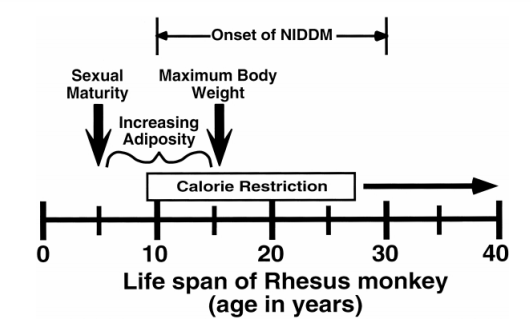Abstract
Long term chronic calorie restriction (CR) of adult nonhuman primates significantly reduces morbidity and increases median age of death. The present review is focused upon an ongoing study of sustained adult-onset calorie restriction, which has been underway for 15 years. Monkeys, initially calorie restricted at about 10 years of age, are now approximately 25 years old. The median life span of these restricted monkeys is increasing, now exceeding that of ad libitum (AL)-fed monkeys. In our laboratory, maximum life span for AL-fed monkeys appears to be about 40 years. Thus, whether CR can also increase maximal life span, as it does in rodents, cannot be determined for at least another 15 years. The earliest detectable positive benefit on morbidity in these monkeys was previously reported as the prevention of obesity. Current evidence, as reviewed here, suggests that much obesity-associated morbidity is also mitigated by sustained calorie restraint in nonhuman primates. Furthermore, probably because of the prevention of obesity, diabetes has also been prevented. Recent findings include the identification of extraordinary changes in the glycogen synthesis pathway, and on the phosphorylation of glycogen synthase in response to insulin. This calorie restriction-induced prevention of morbidity does not require excessive leanness, but is clearly present when body fat is within the normal range of 10 to 22%, and this is likely to be true in humans as well.
Keywords: obesity diabetes mellitus diabetes mellitus, type 2 calories adult cercopithecidae glycogen (starch) synthase phosphorylation primates rodentia thinness insulin morbidity mortality calorie restricted diet, body fat, life span, overweight and obesity prevention prevention symptom onset glycogen synthesis

Fig. 1. Approximate life span of the rhesus monkey showing the relationship between the CR protocol and the development of obesity and diabetes.
Tel : 028-8592-1823 (in China)
Tel:+1-517-388-6508 (in US)
Tel : +86 (28) 8592-1823 (outside of China)
Fax : +86-28-62491302
Zip code : 610041
Address: No.88, Keyuan South Road, Hi-tech Zone, Chengdu, Sichuan Province, China